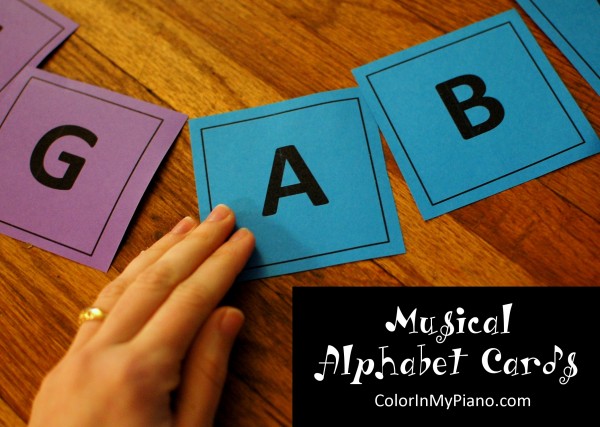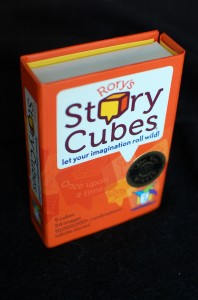I have a new game to share today: Piano Finger Twister!

I have a new game to share today: Piano Finger Twister!

I’ve been wanting a floor staff for a long time. Now I finally have one!

My Homeschool Class and my Piano Readiness Class both recently finished their Musical Instruments Workbooks. We usually complete just two pages each class, so it took us awhile to get through it!
Now that we’ve finished it, we’ve been playing a fun little sorting/quizzing game using the deck of instrument cards that came with my MiniMusic kit. This competitive game has been quite a hit!

Continue reading “Musical Instruments Quizzing/Sorting game”
 This is a simple game to play with groups of students that makes note-naming flashcards a bit more interesting. It involves sorting the flashcards onto alphabet letter signs on the floor, as pictured on the right (the “A” flashcards would go in the blank space on the right side of the page).
This is a simple game to play with groups of students that makes note-naming flashcards a bit more interesting. It involves sorting the flashcards onto alphabet letter signs on the floor, as pictured on the right (the “A” flashcards would go in the blank space on the right side of the page).
The game is pretty flexible, because beforehand you can sort out exactly which flashcards you want to focus on with your students. This also allows you to control how long you wish the game to continue.
You can also use different flashcards. With my Homeschool Music Class this week, we used my Piano Key naming flashcards (they came with the MiniMusic set I purchased earlier this year). With my Piano Readiness Class, we’ve been doing on-staff work so we used regular staff-note-naming flashcards (I use this set from Faber & Faber, but any flashcards will do).
Another tip with this game: if you are using the note-naming flashcards, arrange the musical alphabet signs on the floor in a column, so that A is at the bottom and G is at the top. I recommend this because this arrangement resembles the staff, where the musical alphabet progresses vertically. If you are using piano-key-naming flashcards, I would arrange the signs on the floor horizontally, just like the keyboard.
Download the pdf of the alphabet signs and detailed gameplay instructions by visiting the Printables > Games page. Scroll down to the M’s for “Musical Flashcard Sorting game.”
 Musical Flashcard Sorting game (1.2 MiB, 13,543 hits)
Musical Flashcard Sorting game (1.2 MiB, 13,543 hits)
I don’t know about you, but I’m always on the lookout for creative and inexpensive items for my teaching. The dollar store is one of my favorite places to go!

In the craft aisle at Dollar Tree right now, there are packages of foam cubes, as shown in the picture. I’ve always wanted to make scale blocks like Natalie Wickham’s, but have never got around to buying the wood blocks and paint. These foam cubes seem like a pretty good alternative, although they may not last as long I suppose. On the upside, it doesn’t take long to write the alphabet letters on these little cubes with a marker! I am going to go back to buy a couple more packages, so I can make a nice set of scale blocks using the orange colored cubes. Continue reading “Recent Purchases: Scale Blocks & A Technique Monkey”
I don’t normally do much for Halloween, but I am doing a couple of little things this year with my students:
I found this game on D’Net’s Layton Music website. Basically, students “earn” their Halloween treat by clapping rhythms! When my students came to their lessons last week, we started with this game. They have to do as many “trick” (rhythm) cards as it takes until they draw a “treat” card. D’Net has the best game ideas. I definitely plan to reuse this next year!
Occasionally, I like take a week off from my students’ normal theory book assignments so I can give them a supplemental worksheet targeting a specific skill, or simply so I can give them a just-for-fun worksheet! Susan Paradis’ Bat Facts worksheet is perfect for a just-for-fun worksheet, while giving students a chance to review identifying note names on the staff. Plus, students get to learn some true fun facts about bats!
Happy Halloween to you all! What activities did you plan?
There are others who have shared alphabet card printables similar to what I’m posting today, but I’m adding mine to the mix anyway. 🙂 I wanted some that would work well to print onto colored cardstock paper. Since I don’t have a color printer, this is an easy way I can still get colorful things to use with my students!

I used these cards with my new weekly Homeschool Music Class (just started last week, thanks to Sheryl’s recent post at her Notable Music Studio blog) and with my Piano Readiness Class. My students LOVED making “musical alphabet snakes” in order to learn how the musical alphabet is different from the regular alphabet. Included in the pdf is a card which outlines some other possible activities to do using the cards. These activities work great in both group settings and private lessons.
Do you have some other activities to share that involve alphabet cards? Share them in the comments!
To Download: visit the Printables > Other Resources page and scroll down to the M’s for Musical Alphabet Cards.
 Musical Alphabet Cards (275.9 KiB, 17,819 hits)
Musical Alphabet Cards (275.9 KiB, 17,819 hits)
 Here’s another session given by the well-loved pedagogue Marvin Blickenstaff from the 2011 OhioMTA Conference:
Here’s another session given by the well-loved pedagogue Marvin Blickenstaff from the 2011 OhioMTA Conference:
Piano Pedagogy 101: Reviewing the Basics
Mr. Blickenstaff introduced this session by commenting that at conferences and workshops, we often hear ideas for teaching intermediate and advanced students, but we don’t very often hear ideas for teaching beginners during that first year of piano lessons. The purpose of this session to give a refresher of sorts and to provide new ideas for teaching beginners, particularly in groups.
Mr. Blickenstaff basically led us through a series of short activities that he uses during group classes with beginners. He begins the first few classes with some icebreaker activities that all students can succeed doing. These initial successes set the tone for the entire year!
Here are a few examples of some of the beginner-level icebreaker activities Mr. Blickenstaff likes to use with his students:
Continue reading “2011 OhioMTA Conference (4): Piano Pedagogy 101, by Marvin Blickenstaff”
Happy 4th of July! Today, America celebrates Independence Day. My parents have come over to visit us and see our new place, and we have a fun day of activities planned. 🙂
My husband and I are still exploring our new town and figuring out where things are. It’s kind of fun!! 🙂 Last week, I visited the local Goodwill store and found a bunch of Beanie Babies in really good condition for just 50 cents each. I’m such a sucker for thrift stores and consignment shops! I managed to find an animal for each letter of the musical alphabet except for “F”…I guess I need to find a frog, perhaps?! 🙂
You’ll notice I have more than one beanie animal for “C”. I simply couldn’t make up my mind.
Once I find that elusive frog for “F”, then I just need to get a floor staff! I have a few ideas for making a floor staff myself. We’ll see what happens during the upcoming weeks/months. I can’t wait to plan some games for my young beginner students using these furry friends. 🙂
 Last week, we talked about the logistics of having group lessons — how often, how to schedule them, etc. — and we received a few great responses. Thanks so much!!
Last week, we talked about the logistics of having group lessons — how often, how to schedule them, etc. — and we received a few great responses. Thanks so much!!
This week, perhaps we can continue the discussion:
What kind of activities can be conducted during group lessons? Do your students have a favorite activity? How do you decide what to cover each week? What benefits have you seen from holding group lessons in your studio?
Please share your tips and ideas in the comments below!
 Before I begin, allow me to give credit where credit is due for this wonderful idea: I got this idea from Laura on her blog (click here). I was so thrilled to see her idea of using these “story cubes” for improvisation with piano students!
Before I begin, allow me to give credit where credit is due for this wonderful idea: I got this idea from Laura on her blog (click here). I was so thrilled to see her idea of using these “story cubes” for improvisation with piano students!
Meet “Rory’s Story Cubes.”
Rory’s Story Cubes consist of a set of 9 dice with all kinds of pictures on their faces. I think English teachers use these as a starting point for writing stories.
Piano teachers can use them too. =)
Let me tell you about how I’ve been using this fun new prop.
During a piano lesson, I gave my student all of the dice and asked her to roll them. Here’s what they look like:
Continue reading “Improvisation Activity: Rory’s Story Cubes”
 My colleague Loretta and I have been teaching a pair of beginner students in a group setting each week. Last week, we were learning about 3/4 and 4/4 time, and quarter notes and half notes. Loretta and I wrote rhythms on the whiteboard, asked the students to help us write in bar lines, and then clapped and counted the rhythms together. While this activity worked and was beneficial, what we did this week was much more successful.
My colleague Loretta and I have been teaching a pair of beginner students in a group setting each week. Last week, we were learning about 3/4 and 4/4 time, and quarter notes and half notes. Loretta and I wrote rhythms on the whiteboard, asked the students to help us write in bar lines, and then clapped and counted the rhythms together. While this activity worked and was beneficial, what we did this week was much more successful.
On Anne Crosby Gaudet’s website, we discovered her wonderful Music Discoveries Rhythm Blocks pdf. The pieces are easy to print and cut out. In class today, our two beginners were so excited to make their own rhythms and try clapping them. With Ann’s rhythm blocks, it’s easy to tell how many beats each note gets! Click here and scroll down to view Ann’s printable on her website.
Go figure – give students something hands-on and creative, and they will get more out of it! (Especially when the students are young beginners!)
What kinds of hands-on activities have you discovered for your students lately?
Your Cart is Empty